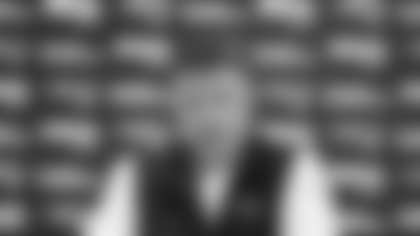Patriots fans can breath easy. Tom Brady's contract extension is complete. Now you can move on and start worrying about the next big one. You can start laying out who else this team can't live without while never learning that there are very few, if any, that it can't. The team set a price for Brady and worked a deal with its star quarterback. The team set prices for guys like Damien Woody and Ted Washington and didn't agree to a deal. The team will set a price for Richard Seymour and work hard to keep him as well. It's always the same. Don't fall in love with guys because all it takes is for them to try to break the bank in free agency for them to be gone. Mike Felger's Monday story listed a bunch of contracts set to expire over the next couple of years. Some of those players will not re-sign here because the team has to maintain a workable salary structure to maintain success. That's why strong drafting is critical. You need guys to replace those who walk for more money. Unfortunately that's the business. It's kind of a cold truth. What do you like better, players or winning? We can be sentimental about guys. Bill and Scott cannot. So prepare to lose some key contributors as guys playing on their rookie deals look for the free agent score they deserve and have only once real chance to get. Hopefully for Patriots fans, many find the offers here to their liking just as Brady did. But Jason begins Ask PFW this wondering about the deal.
Far be it from me to challenge the omniscient triumvirate of Belichick-Pioli-Kraft, but is this contract with Brady really a good idea? Before you castigate me, I've got Brady jerseys at home, I think he's the best QB in the league, and I'm thrilled we have him. But I don't want the Colts. I don't want a couple extremely highly paid players and a castoff defense. He's a great quarterback -- that's obvious -- but he's not one lone dominating player (e.g., Shaq): Long term high-dollar contracts are renegotiated all the time. In fact, from what I've read, Brady's six-year deal is unlikely to last even the three-year benchmark by which teams/players evaluate contracts because of a new CBA on the way and the "option" due next year. He's getting bonus money salary in those three years that exceeds Peyton Manning, so no one can say he's not well-paid by this thing or he "took one for the team." What happened to "if you want to play here you make sacrifices personally for the team."? What happened to "we're not going to sacrifice our future years for the present?" My problem with the contract is two-fold: 1. It's enormous. Brady didn't win us those Super Bowls. A well-balanced team with lots of median-salary players that included Brady did. Who kicked the kicks? Who intercepted Warner for a TD? Who stripped Delhomme at the 12? Not Brady. You think if Manning had our kicker and defense he'd have been sitting at home the past three years? Thus, the contract seems excessive for a vital, but only singular, part to the team. But that's not really the main problem with it. Because if all it was was money outlay and cap costs, that would still be great to have the QB of the decade locked up. If it was DONE and he'd be here for the rest of his career and it was just expensive, fair enough. The guy deserved it. The PROBLEM is, however: 2. It's a renegotiation of a contract (with 2 years left) that pays more but will have to be renegotiated (within two years) but in such a way that the big costs are up front instead of backloaded. That's a long way of saying Brady got an inexplicably good deal. He's going to get his big money early (note this is opposite of traditional signings like Law's which had his big cap hits and signing bonus late). Now I know part of that is the singing bonus, but then why the heck did they make next year's "signing bonus" an option? That can't be prorated so they have to renegotiate it or they take an enormous (what, $13 million or something) hit on the cap next year? Basically, we've hamstrung our cap for two-three years without actual relief afterwards, which is what you'd expect for such an investment, because the contract is written so that it'd have to be renegotiated anyway! Which usually means more bonuses and more early cap hits. What players do you know that when a renegotiation came up, said "no gee, really, keep your bonus money, you guys paid me great before." How is this helpful? Why is this a good contract for the PATRIOTS (looks great for Brady)? What am I missing? Enlighten me.
Jason Jarvis
That's a great, thoughtful email Jason. I hope my response compares. Caponomics can be very difficult to understand without a firm grasp of the CBA and even then you almost need to be a lawyer to understand the language. But first let me say that while I agree that the team and no individual player won three Super Bowls, I also think you vastly underrate Brady's role in it. One could argue that if Peyton Manning didn't throw 4 interceptions in the 2003 AFC title game that his team might have won. One could argue that if the Colts offense could have stayed on the field for more than 2-3 minutes at a time last January that a Colts defense that allowed a mere six points through 2 quarters would not have been exposed to such a heavy dose of Corey Dillon. Now, that said, the Patriots defense had something to do with that. So it can be a chicken or the egg argument. But Brady did not make the mistakes that Manning did and when he's needed to make big, clutch throws under the most intense pressure, he's done it. Yes Adam made the kicks, but who engineered the drives? Also, it was Troy Brown, David Givens, David Patten, Daniel Graham and Deion Branch making big catches in big spots. So yes, it was and always will be the team that wins and loses over one player, but the quarterback typically has the biggest impact on results because of the mental DECISIONS he makes with the ball in his hands 50-70 times per game. The 30-plus times in which he throws it have arguably the most direct impact on the game's outcome more so than any other single entity. Now on to the contract. By no means do I think Brady took any huge hometown discount, but he certainly could have tried to hold out for the signing bonus money gobbled up by other quarterbacks with lesser resumes and might have been justified in doing so. He will be paid $31.5 million in the first two years of the deal and the structure of the contract virtually ensures that he will be paid all $60 million of the contract unlike some other big deals that get backloaded with fake years in place to spread out the signing bonus and make an agent look good. But while Brady didn't give any huge discount, he also didn't hold the team hostage as he could have for upwards of $100 million. This is good, sound deal for both sides. It averages $13.1 million per year over the first three years and makes him one of the highest paid players in the league, a distinction he's earned with his play at arguably the game's most important position. That said, it doesn't destroy the salary cap down the road. He will receive his $14.5 million bonus up front, which will be prorated over the life of the deal. Because of the option bonus due next spring, Brady's cap number for 2006 reportedly jumps from $8.4 million to $14.4 million, but, and this could be a critical element of the deal's structuring, it may have been structured this way because of a sharp anticipated boost in the 2006 cap because of the new broadcast contracts. The first year of those broadcast deal payouts will offer a spike in the cap and the Patriots may be able to absorb the big 2006 hit before his number levels out thereafter when the cap increases at a flatter rate. Good quarterbacks carry high cap figures. That's the way it is. After 2006, Brady's won't be unmanageable in terms of building a team around him. That's why the team did not go against its philosophy in structuring a deal that certainly seems fair to both sides. The team seemingly will never be forced to do a major restructure late in the contract when age becomes an issue. That's when teams have to use the credit card to keep a guy around and end up with huge dead money cap hits when the player retires or moves on (Elway, Aikman, Emmitt Smith). Brady will be 28 when this season starts and will be 33 when he plays the final year of the deal in 2010. If he is still productive at the time and looks to re-up with the team, he will do so with his age working against him receiving another big bonus on a long-term deal. So he will get his $31.5 million in the first two years of this deal with $26.5 million in bonuses. That seems to me to be the highlight for him and his agent. Manning's cap numbers reportedly approach $18 million-$20 million later in his deal. Brady's are not ever scheduled to climb even near that. This is a real $60 million contract.
Reportedly, the Patriots have signed Chad Brown who played at the University of Colorado. Ted Johnson also played at Colorado. Given that they differ in age by only two years, do you know whether they ever played together in college?
Kent Pandolf
Brown left Colorado after the 1992 season and Johnson was a four-year letterman from 1991-1995 so yes, they were college teammates.
With the O-line shored up and the signings of Chad Brown and Scott through free agency, what's the next agenda for the Pats? Is it to add depth at whatever position is available? I feel the CB position could use much more depth especially if the Pats don't pickup Poole's contract.
Moses
I think with Scott in the mix along with Starks, Samuel, Gay, Poole and Hobbs to go with other more long shot types in Ike Charlton and Hank Poteat, the Pats have solid even if unspectacular depth. There is nothing to pick up in Poole's contract. He was due a $600,000 bonus which I believe has already been paid, virtually guaranteeing his roster spot for 2005. People seem to be speculating that Poole could be cut just as they did with David Patten the past two years. I never believed Patten would be cut and don't believe Poole will be this year either. If the Patriots have in fact paid Poole his bonus, he is all but guaranteed to be here unless he retires. I don't think there is one specific area left to target. It's now a matter of examining any good players available and investigating what it would take to sign them and how they would fit in. There are no big holes to fill.
EXCELLENT Moves to get Flutie to tutor and back up and getting Brady signed for next decade. Hopefully there will be something left for Seymour. The numbers in Brady's contract appear to anticipate a "cap-gap" when the current cba expires. Any number crunchers among you willing to explain the projected cap and new TV deals? I'm hoping Chad Brown returns to his glory days until a youngster (Beisel) steps up. Looks like the Postons greed bit them in the backside law will be lucky to get half the Patriots offer. Keep up the great work.
Mr. Jules
Well, I don't think the CBA will be expire before the sides agree to an extension. If it reached 2007 with no an agreement, it would be an uncapped year. An uncapped year, while on the surface might be good for players, would not be good for anyone in the long run. The labor peace that has existed for more than a decade has the helped the NFL become the best league in professional sports. The uncapped year would be in 2007 and Brady's cap jump is in 2006 so it's not relevant to his deal. My guess, as I stated in the opening question, is that the team anticipates a spike in the cap because of the new TV deals, some of which are in place and another which is still being worked on if I'm not mistaken. On Chad Brown -- he certainly offers experience and position flexibility. If healthy, he will be a nice addition while the Pats try to groom Beisel in the system and possibly even let Dan Klecko make his transition to inside linebacker. As far as the Postons go, they gambled and lost and it seems they are always trying to squeeze every last dime out of teams rather than truly negotiating with clubs. They were lucky that guys like Orlando Pace and Charles Woodson weren't injured playing on one-year Franchise deals, but were not so lucky with Law and Ian Gold for whom they turned down lucrative extensions only to see their client suffer a major injury that were costly financially. But that said, Law was 30 and coming off a tremendous season. They didn't think the Patriots offer was good enough for their client and if that's the case they should have declined it. They knew the risk, and with the benefit of hindsight may have taken the deal. You can't judge their decision because of the injury, but on the circumstances that existed at that time. Hindsight, however, proves you correct. I wouldn't want them advising me. That much I know.
I know the Pats can bring in as many people as they want for training camp, but how many is too many? With Chad Brown now on the team, I don't see Monty Beisel playing all that often, and I heard the whole reason he decided to come here was so he would have a chance to play more than he did in KC. So my question is: What's with all the competition at linebacker? Aren't these new guys really going to be bummed when they get cut? Do you think we might actually keep like ten linebackers on the roster?
Morgan Van Lent
Actually, they are limited to an 80-man roster plus NFL Europe exemptions. The players playing in Europe do not count against the training camp roster limit. So they can't have as many as they want for training camp. Monty Beisel will play. First off, the Patriots are not young at inside linebacker with Ted Johnson and Chad Brown probably the guys who figure to start if Tedy Bruschi doesn't play. Yes, they drafted Ryan Claridge, but I'm assuming he's not ready to step in and play yet. The Pats had to prepare for life without Bruschi in the event he doesn't play next season. Don't forget that linebackers who can run are big special teams contributors so in addition to working in on defense and providing depth, some of the linebackers, if not all, will contribute in the kicking game. Yes, the Pats could easily keep 10 on the roster. Let's leave Bruschi out of the equation for the purpose of this exercise and I can see Johnson, Brown, Beisel, Claridge, Colvin, McGinest, Vrabel, Izzo and Banta-Cain as solid. That leaves Don Davis, Matt Chatham and Eric Alexander, all of who were with last year's club, along with Wesly Mallard to battle for a spot or two. Competition will be fierce just the way coaches like it.
Okay, I can understand that you guys might have herd just about enough on the draft, but maybe ya can find time to answer my question. Why didn't Jason White get drafted? I mean, I understand he has a history of knee injuries, and I have even heard he chokes in big games. But he still won the Heisman trophy, Maxwell Award, Davey O'Brien Award and the Johnny Unitas Golden Arm Award. Not to mention he threw 70 TDs in his career, and there wasn't even that much talent at QB in this year's draft. So what's your take on why he didn't get picked, especially by the Pats, maybe even with the last pick, not that I have anything against Andy Stokes. But they might have signed him as a rookie free agent, and I even heard the Pats plan to make Matt Cassel a late-round version of Matt Jones, so it wouldn't have been so made to take another QB. Thanks for taking the time to read this.
Adam Sennot
White's arm strength was apparently a big deterrent. I guess he just doesn't have NFL skills. His ability doesn't translate to NFL success even though he was productive in college. I didn't scout him and have only seen him play probably in bowl games and I was never impressed. But the kid did win a Heisman so what do I know? But can 32 teams all be wrong? They could. Heck, Preist Holmes was undrafted. But White even had a tryout with Kansas City during the Chiefs rookie mini-camp and the team elected not to sign him. Then add the fact that he has played poorly in big games, which coaches definitely evaluate, and you can see him drop like an anchor on draft boards. If he has bad knees, that's just another red flag.
In light of the recent signings, where does R. Davey fall on the depth chart for quarterback?
John McCullough
Right now, he's still No. 2 until someone takes that job from him. Last year, New England signed Jim Miller, a veteran with experience, yet Davey climbed to No. 2 on the depth chart and stayed there after being No. 3 behind Tom Brady and Damon Huard for almost all of the 2003 season.
Thanks for your feedback on the steroids policy in the NFL, but you left the second part of my question unanswered when you stated, "... the league does fine the guilty four weeks' pay, which as you pointed out does amount to a quarter of the season. I think it's a stiff price to pay but certainly fair." Who gets the fine... the team, the league, the union pension fund, some charity?
Otis Hill
The team withholds the money when a player is suspended because it then must pay somebody else to fill the spot on the 53-man roster. So it's not as if it pockets the cash. It simply redistributes it. When a player is fined for some on-field indiscretion such as a blow to the head, that money goes to NFL charities.
After reading all the praising and whining about the draft, I have only two things to say. I BELIEVE!!!!!! Don't you?Robyn Opacki
How can you not? Even a cynic has to believe.
I would just like to respond to the INDECENT comments spouted by a purported Pats fan about Doug Flutie. To call this guy out as problematic is insane. Doug Flutie racked up 20 wins in Buffalo, and would've had more if the brains of that organization and WADE PHILLIPS had not blown it by trying to make Rob Johnson a starter. Johnson, which we all know now, was a terrible NFL player, and all Flutie did was find a way to win. So lay off Chu, you are severely mistaken. Also, just as a side note...if you ever have to question Flutie's intentions again, let me alert you to this fact. Despite having been screwed over by Phillips big time in Buffalo, Flutie was able to work alongside the Wademeister in San Diego for the past couple seasons. PFW, I know everyone's opinion counts, but please, make an exception every once in a while and keep the needlessly negative crap off the site.
Tim Machan
Canada
Doug played well in Buffalo, but neither he nor Johnson came across as real team guys during their stay together because both made comments about each other in what became a bitter quarterback debate that separated a region and probably a team. Doug certainly felt he should have been the starter because he obviously thought he was better. It looks like he was right. Neither guy ever won a playoff game in the league if I'm not mistaken. Doug's merits are open for debate with you, Tim, and Chu having equal opportunity to defend him or criticize him. One certainty with Doug is that he seems to play his best football in the critical spots, a fact that can never be overlooked. That's uncoachable. That said, before the Music City Miracle, Rob Johnson engineered a go-ahead drive in the final minute to seemingly give Buffalo a playoff win. I don't simply accept that Buffalo wins that game with Flutie playing given that in the last five games of that season in which Flutie started, the Bills scored more than 20 points just once and they lost the playoff game 22-16 with Johnson at the helm. Now, should Johnson have started that game over Doug? No way, no how, never. Not even Chu could make that ridiculous argument. Doug started almost all season for a team that went 11-5 and then after Johnson played well in the finale, they decided to play him in the playoffs? Crazy. Inexplicable. Ludicrous. That was the end for Wade. Doug certainly knows his role here and if he didn't accept that, he would've gone somewhere else to finish up his career. I'm sure it's nice to be back home.












































